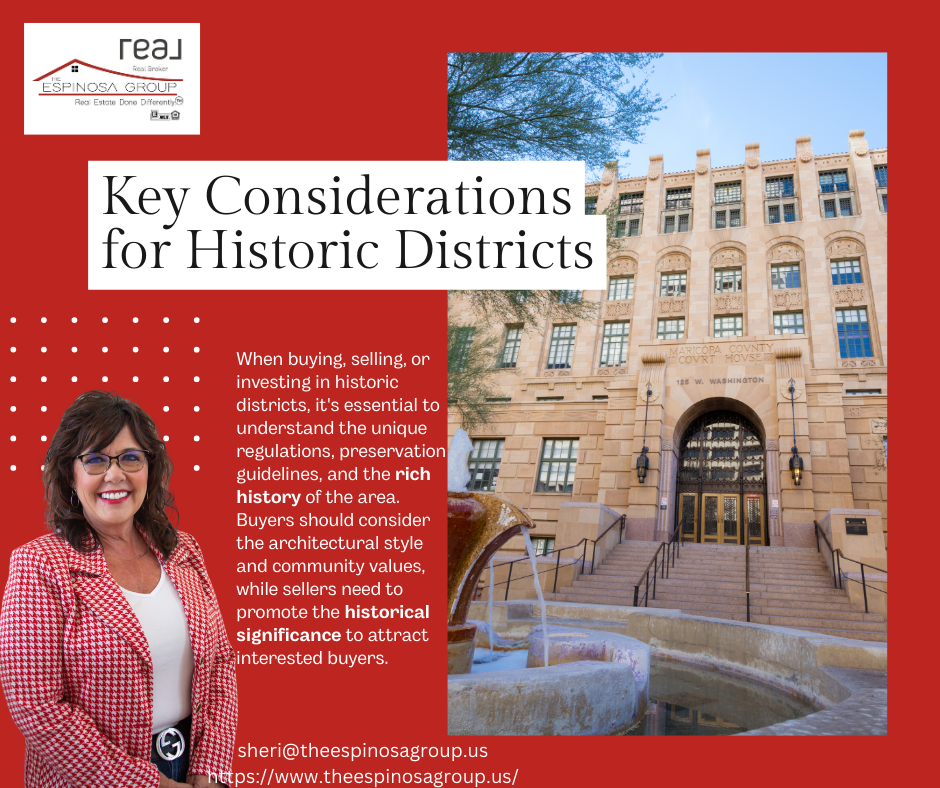Key Considerations for Buying, Selling, or Investing in Historic Districts
 Purchasing a home in a historic district can be incredibly fulfilling, but it comes with its own distinct set of challenges. Whether you’re buying, selling, or investing, it's crucial to understand the complexities of these areas to make well-informed decisions. Here's what you need to know about navigating historic districts.
Purchasing a home in a historic district can be incredibly fulfilling, but it comes with its own distinct set of challenges. Whether you’re buying, selling, or investing, it's crucial to understand the complexities of these areas to make well-informed decisions. Here's what you need to know about navigating historic districts.
What Are Historic Districts?
Historic districts are areas that preserve a community's architectural and cultural heritage. Homes in these neighborhoods often feature distinctive architectural styles and significant historical value. While these properties exude charm and character, owning one comes with specific regulations aimed at preserving the district’s integrity.
What Buyers Should Consider
-
Understand Local Regulations: Before falling for a historic home, research local preservation laws. Many districts have strict guidelines concerning renovations, exterior changes, and even landscaping. Knowing these regulations upfront can help you avoid any surprises later.
-
Conduct Thorough Home Inspections: Historic homes can have hidden problems that may not be immediately visible. Detailed inspections are essential to uncover any structural issues, outdated electrical systems, or plumbing concerns. This will also help you assess the potential cost of necessary renovations.
-
Explore Financing Options: Purchasing a home in a historic district might qualify you for special loans or grants aimed at preservation. Look into programs like the Federal Historic Preservation Tax Incentives or state-specific grants that could help with renovation costs.
-
Review Insurance Requirements: Insuring historic properties can be more complex than standard homes. Speak with your insurance agent to ensure you have coverage that reflects the potential risks of owning an older property.
-
Get Involved in the Community: Historic districts often have active communities that emphasize preservation efforts. Engage with local homeowners' associations or neighborhood groups to understand the community's dynamics and participate in ongoing preservation activities.
How Sellers Can Market Historic Homes
-
Highlight Unique Features: When selling a historic home, focus on its unique architectural elements and historical significance. Many buyers are drawn to the charm and character of older homes.
-
Provide Historical Documentation: Buyers will appreciate detailed records of the property’s history, including past renovations or restorations that followed preservation guidelines. This documentation builds trust and underscores your commitment to maintaining the home.
-
Be Transparent About Regulations: Make sure buyers are fully aware of any restrictions regarding renovations or alterations. Transparency around preservation guidelines will set clear expectations and build trust throughout the transaction.
-
Emphasize Community Perks: Promote the benefits of living in a historic district, such as proximity to cultural landmarks, thriving local businesses, and events that celebrate the area's rich heritage.
Investment Opportunities in Historic Properties
-
Consider Long-Term Value: Historic properties often appreciate more than newer homes, thanks to their unique appeal and limited supply in desirable areas. Properly managed, these investments can provide significant returns.
-
Look for Renovation Potential: Investors should seek properties that require some renovation but have strong foundational elements. Be mindful of what renovations are allowed under preservation guidelines before purchasing.
-
Stay Informed on Market Trends: The market for historic homes can behave differently from general real estate. Demand for these properties may vary depending on economic factors, interest rates, and buyer preferences for distinctive homes versus modern builds.
-
Work with Experts: Collaborating with real estate agents who specialize in historic homes is invaluable for investors. These experts offer insights into pricing trends, neighborhood dynamics, and potential investment opportunities.
Conclusion
Buying, selling, or investing in a historic district is about more than just owning property—it's about preserving and participating in a community's legacy. Whether you're a buyer intrigued by the charm, a seller sharing a home's story, or an investor looking to maximize returns, understanding the unique considerations of historic districts will guide you toward informed and successful decisions.
Embrace the history and charm of these iconic neighborhoods and enjoy the perfect blend of modern living with a deep sense of heritage.
Categories
- All Blogs (225)
- Contracts, Negotiations & Process (4)
- Home Buying Process (19)
- Home Buying, Selling, and Investing Tips (65)
- how to buy a house (9)
- How to sell your house (11)
- Importance of a Real Estate Agent (1)
- real estate investment strategies (14)
- Real estate Market in Arizona (7)
- ROI tips (14)
- Selling a home (19)
- STAGING DIFFERENTLY (37)
- Staging tips for selling (23)
- THE AGENT (5)
Recent Posts












